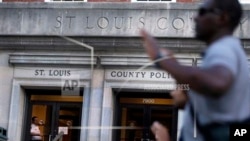Weeks after the fatal shooting of an unarmed 18-year-old in Ferguson, Missouri, violent nightly protests have given way to the calm deliberations of a grand jury — a group of 12 private citizens who will decide whether criminal charges should be brought against police officer Darren Wilson who fired the deadly shots.
Grand juries are among the most mysterious and secretive of U.S. judicial institutions, little understood by most Americans, much less citizens of other countries. But I gained a rare insight into their inner workings this summer when I was randomly chosen to serve for five weeks on a 23-person grand jury in Washington, D.C.
Grand juries date from 12th century England, where they were established to protect commoners from overzealous prosecution by the king. In the United States, that right is enshrined in the Fifth Amendment of the Constitution, which provides that “No person shall be held to answer for a capital, or otherwise infamous crime, unless on a presentment or indictment of a grand jury.”
Authority over grand juries rests with the 50 individual states, and the rules vary from state to state with activities ranging from indicting serious crimes to investigating criminal activity and the conduct of public officials.
Unlike trial juries, which meet in open court and decide whether a person charged with a crime is guilty or innocent, grand juries only hear evidence presented by a prosecuting attorney. Charges are brought if the jury determines there is "probable cause" that a crime was committed and that a specific person or persons may have committed it.
During grand jury proceedings, neither the judge or the person suspected of committing the crime is present. Proceedings are held in secret to protect reputations of the innocent.
My own 23-person grand jury served every day for five weeks, just like an eight-hour workday, with breaks built in for coffee and lunch.
But as at any job, people call in sick or cannot show up for other reasons. So the rules require that just 16 grand jurors — known as a quorum — need to be present in order for the jury to review evidence, hear witness testimony and participate in deliberations.
After the prosecutor has presented all of the state's evidence, he asks the jury to issue an indictment and leaves the room. Grand jurors then vote by a show of hands on each of the charges under consideration. For our jury, 12 "yes" votes were needed for a suspect to be indicted; in Missouri, it will require nine "yes" votes from the 12-person jury to indict officer Wilson.
I am not allowed to divulge details of the more than 70 cases we heard during my five-week stint. But the jury I served on reviewed evidence for homicides and other major crimes such as attempted murder, armed robbery, assault, and domestic violence. We listened to and questioned witnesses, crime victims, police officers and occasionally criminals in prison jumpsuits.
Many of the cases centered on a demographic defined by poverty, unemployment and poor education.
Not every case we heard ended with an indictment. In fact, fewer than half of them did, leaving the others to be reviewed by subsequent grand juries.
The five weeks I spent with prosecutors, witnesses, police detectives and my fellow jurors gave me an insider's look into the criminal justice system of the United States.
The experience made me sympathize with the faceless victims who make up the sometimes numbing crime statistics, and respect those who makes sure the accused face charges grounded in truth and fact as opposed to rumor and innuendo.










